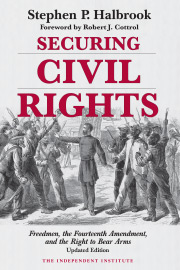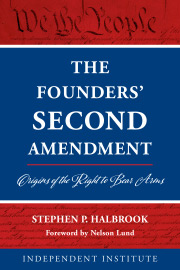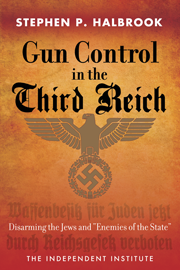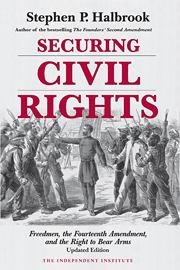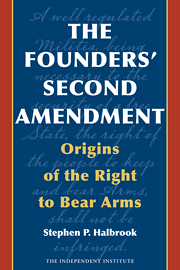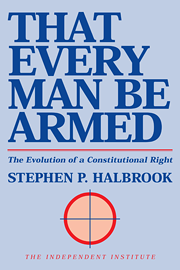“That would be an odd ‘right of the people’ if limited to militias,” commented Chief Justice John Roberts in the Supreme Court hearing March 18 in District of Columbia v. Heller.
The case concerns whether the District of Columbia’s ban on handguns violates the Second Amendment guarantee that “the right of the people to keep and bear arms, shall not be infringed.”
Referring to the American Revolution, Justice Antonin Scalia noted that “tyrants took away the people’s weapons, not just those of the militia.”
For the American settlers, Justice Anthony Kennedy added, “Wasn’t there a need for self defense against Indian attacks, robbers, wolves and grizzlies?”
In recent years, Kennedy is the swing vote in close cases.
The founders were not concerned with personal protection, insisted Walter Dellinger—solicitor general during the Clinton Administration, and now arguing for D.C.—but only with “bearing arms” in the militia.
“Does the amendment have any effect today?” queried Justice Ruth Bader Ginsburg.
“Only if a federal law restrained state militias,” Dellinger responded.
So this “right of the people” has shriveled into a meaningless gesture exercised only by permission of the government. But the “exclusively militia” interpretation is only a facade. Those who deny this right of the people would be equally opposed to a robust state militia system in conflict with federal authority.
The text of the Constitution already had a militia clause. As Kennedy noted, the preamble to the Second Amendment—“a well regulated militia, being necessary to the security of a free state”—supplemented that clause. “My view is that the amendment guarantees a general right to bear arms without reference to the militia.”
And Scalia added that historically, English bans had been imposed on possession of arms by oppressed groups, such as Roman Catholics and Scottish Highlanders.
Which “arms” are constitutionally protected? One test is whether the arms are of a type “commonly possessed” by the people.
Dellinger tried to scare the court away from sanctioning handguns under this test, on the basis that it would also sanction machine guns, of which more than 100,000 are registered with the feds. Not an impressive number, given our population of 300 million.
Solicitor General Paul Clement argued, on behalf of the United States, that the right is individual, but that the court should not decide whether the D.C. ban is unconstitutional.
This “just don’t know” attitude may be explained by fears that the Justice Department’s prosecutions of citizens under this very ban for 30 years might be reopened.
Clement also worried that voiding the ban would question restrictions on machine guns and armor-piercing ammo, but Chief Justice Roberts reminded him that the only issue is handguns.
Justice David Souter found “keep and bear” to be a unitary concept “what is served by bear, if you can keep?” He quipped that “you do not bear arms to hunt; no one in the 18th century talked that way.”
“Keeping” refers to possession in the home, Clement responded, and “bearing,” to carry.
Jefferson sponsored legislation specifically referring to “bearing a gun” while hunting.
Alan Gura presented the case for Dick Heller, the court security guard who lives in Washington, D.C. and protects judges with a handgun by day, but is not trusted with having one when he goes home.
Justice Stephen Breyer queried how handguns had a militia purpose, and why was it not reasonable to ban them, given the high murder rate?
“The handgun ban,” Gura responded, “weakens military preparedness.”
Some seemed ready to scrap a militia arms test. “The second clause of the Second Amendment,” insisted Scalia, “goes beyond the militia—it is a right of the people. Why not acknowledge that?”
Kennedy stated that a machine gun is more related to the militia than the handgun, but the latter is relevant to the homeowner.
Stevens asserted that “only” two of the original states, Pennsylvania and Vermont, had arms guarantees referring to self-defense, and “all the others were for common defense.”
Yet only two other states—North Carolina and Massachusetts—had an arms guarantee, and both accorded the right to “the people,” even though they referred to common defense purposes. As Gura pointed out, those provisions were interpreted to recognize self-defense.
As is usual, the justices engaged in their own fencing match.
“Look at the murder rate, the crime statistics,” anguished Souter.
“All the more reason to allow homeowners to have handguns,” implored Scalia.
Long guns, even though they must be trigger-locked and unloaded, would do fine for home defense, Dellinger insisted as the last word. He could remove the lock in three seconds, albeit in daylight.
“And how long if you’re awakened at 3 a.m. and you reach for the lamp and your reading glasses?” Scalia asked, to general laughter.
Justice Clarence Thomas asked no questions. But a decade ago, in Printz v. U.S., he wrote an opinion appearing to favor the individual-rights view.
Looks like the Supreme Court is finally ready to recognize the Second Amendment as a real part of the Bill of Rights, and that D.C.’s ban is in big trouble.



